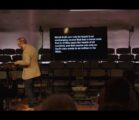Church of God Canon Law?: The Gender Identity Affirmation
Dale M. Coulter
There are two motions dealing with transgenderism. I have already addressed the resolution (see here and here), but I now want to address the proposal to add a statement to the instructions for ministers (agenda item #7). Its intention is twofold: 1) to forbid credentialed ministers from ever using pronouns not in keeping with an individual’s biological sex; 2) to forbid credentialed ministers from allowing any employee under their supervision from ever using pronouns not in keeping with an individual’s biological sex.
There are a number of issues this agenda item raises. In this article, I want to address these issues under two broad concerns. The first is that the Church of God is slowly developing a body of canon law under its guidelines for ministers. Is that wise? The second is that as written the statement seems too broad.
Canon Law?
In the Catholic Church, canon law deals with matters of behavior through a detailed legal code that governs how Catholics should conduct themselves. While the Church of God does not call its statements dealing with ministerial conduct canon law, it strikes me that this growing list functions as a new body of canons. These canons seek to provide tighter and tighter controls on ministerial conduct. Let me explain.
First, the subsections, Instructions for Ministers (S. 29) and Disorderly Ministers (S.30), in the Minutes have been expanded to the point that they are beginning to function like a separate doctrinal and moral section. Between these two subsections, there are at least 16 statements that set forth obligations for Church of God ministers. They deal with everything from loyalty to the Church of God to unbecoming conduct. There are only 12 statements in the Declaration of Faith and 7 sections in the Practical Commitments. The 16 additional statements for ministers form a separate doctrinal, moral, and behavior section that almost equals the doctrinal and moral statements. It’s essentially a set of legal codes, which is why I say it’s a body of canon law.
Second, many of the statements in these sections are redundant. For example, there is a statement affirming traditional marriage even though the Practical Commitments already clearly do just that. Another is loyalty to the Church of God. The Practical Commitments talk about loyalty and affirm its importance. This redundancy seems entirely unnecessary. Why do we need to develop a separate set of legal codes for ministerial conduct?
Third, we must ask whether every new cultural challenge to the faith must be addressed under ministerial conduct. The initial rationale for the gender identity affirmation states, “While the Church of God is clear on Biblical marriage and sexuality, the General Assembly has not addressed by name the culturally unfolding topic of gender identity.” Is it really necessary for the General Assembly to address every cultural issue by adding more codes of law to the instructions for ministers?
The Church of God used to have a specific list of behaviors that it outlawed, including watching movies. When the new practical commitments were adopted in the 1980s, the denomination rejected the need to spell out with great specificity such a list of behaviors. It was not simply that this kind of legal code seemed legalistic, it was that the specificity of the list revealed just how culturally contextual it was. Outlawing going to the movies related to a time before the online world in which individuals stream movies directly into the home.
Is it needful to be so specific in addressing cultural issues in the subsections dealing with ministerial conduct? The question is not whether to address important cultural issues but where and how to address them. Maybe the better approach is to follow the model set forth in the practical commitments. These commitments articulate biblical principles that can be applied in a number of contexts.
Fourth, the Church of God has established clear procedures for ministerial misconduct. These procedures outline a process of accusation, trial, and restoration. Why are these procedures important? Because we do not want a few individuals making decisions behind closed doors as to how a minister should be treated. Invariably, when decisions are made in this way, it invites abuse. I have witnessed Church of God ministers unfairly treated without recourse to a public defense. We owe ministers who give their lives to the denomination fair and impartial treatment on all matters of ministerial conduct.
In the rush to take stands on important moral issues, we must beware that we do not treat ministers unfairly or judge them harshly without an opportunity to defend themselves before their peers. Moreover, the trial process focuses on the crucial importance of discernment. Peers determine whether ministers are guilty and what judgment should result. Outside of this clear and open process, there is ripe opportunity for ministers to try and manipulate things behind the scenes. I have witnessed ministers forging an alliance that calls for the unfair removal of persons they deem to be in violation of Church of God teachings. This is not the way forward. Power corrupts, even in the church.
While I have raised several concerns, this does not mean that the denomination should cease to take stands on important moral and cultural issues. I think it should. Biblical principles must be reaffirmed and applied in the face of moral and cultural challenges. I simply question whether the growing legal code about ministerial conduct is the best way to do this.
Too Broad?
Like the resolution, this agenda item uses the language of the culture war in America. This approach does not take into consideration the global nature of the denomination. In doing so, it overreaches in ways that are entirely unnecessary.
As written, the middle statement applies to every form of employment be it the public or private sector. It states, “Ministers are prohibited and must prohibit their employees from encouraging or affirming people and especially people within their care to identify with their sexual temptation, their unbiblical sexual attraction, or a self-selected gender or gender pronoun, which is incongruent with their biological sex.”
Nowhere in this sentence are places of employment indicated. What if a minister works in a company where the policy is that employees must be addressed by their preferred pronoun? What if the credentialed minister is a supervisor in this company? How can he/she legally require employees to violate company policies? What about a public school system that requires this? Should the minister simply quit? Will the Church of God compensate the minister for the loss of income?
Arguments that the statement does not allow for this interpretation are moot. The only way one knows how a statement in the Minutes gets applied is in the actual process of application. An adopted motion simply stands as written in the Minutes. Its interpretation is left to concrete application to situations, not to what the numerous members of the General Council may or may not have intended by it. Indeed, it is never the case that General Council members have the same intention or vote on a motion for the same reasons. This is why the concrete application of a statement is the only way to know its full interpretation.
Second, I wonder whether the Church of God can actually enforce this statement as written. How will we check to see if there is a violation? Must administrative bishops now ask regularly if this is occurring by all ministers under their care? Will they just deal with matters brought to their attention? If so, will this lead to a basic unfairness in how the prohibition is applied? I suspect some ministers want to use this statement as a hammer to deal with Church of God ministers at Lee University or another educational institution. We may ask whether that uneven application is fair. If it’s going to be applied, it should be applied fairly.
To my mind, this item is overly broad. It also adds to a code of canon law. The initial rationale that the General Assembly has not addressed “by name the culturally unfolding topic” could be applied to every culturally unfolding topic. There is nothing that requires the General Assembly to address “by name” every topic. Instead of creating tighter forms of control, why not use the clear procedures for dealing with ministerial conduct? Why not use the doctrinal and moral principles outlined in the doctrinal and practical commitments of the Church of God? Why not allow the doctrine and polity committee to do its job of applying those commitments to the cultural challenges of the day?
There are clear structures already in place to deal with all kinds of specific situations. R. G. Spurling trusted the community of faith to do just that. I trust the church and its structures too. The Church of God has lasted for over a century by trusting the community.

